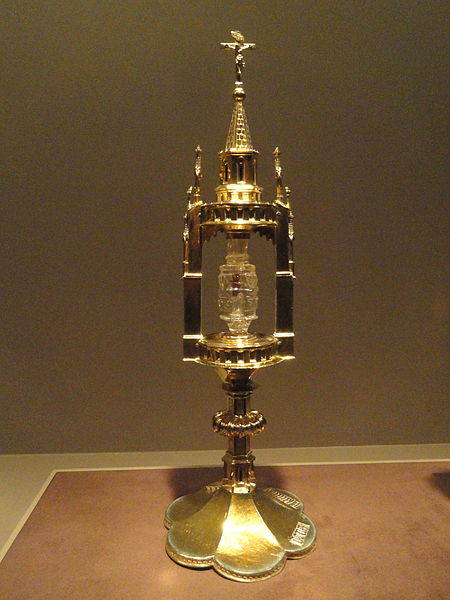One of the issues exposed and exacerbated by the ongoing Gurlitt collection stalemate is the question of Germany’s restitution procedures with respect to art. As the Bavarian legislative proposal to abolish the statute of limitations for claims against bad-faith acquirers is considered by the Bundestag, the “German Advisory Commission for the Return of Cultural Property Seized as a Result of Nazi Persecution, Especially Jewish Property” has issued a decision over what has become known as the “Guelph Treasure” (Welfenschatz) in the collection of the Stiftung Preussischer Kulturbesitz (SPK), the Prussian Cultural Heritage Foundation. The March 20, 2014 opinion (available, so far as I know, only in German at this point at www.lostart.de) underscores the issues around claims of sales under duress, and the appropriate present-day procedural remedy. Readers should also brush up on their medieval German history to keep up.
Limbach Advisory Commission Recommends Against German Restitution of “Guelph Treasure,” Focuses on Terms of 1929 Agreement for Intended Sale
Topics: Holy Roman Emperor Otto IV, German Supreme Commercial Court, Holy Roman Empire, Bundeshandelsgericht, German Supreme Constitutional Court, Z.M. Hackenbroch, Karl Blechen, Duchy of Brunswick and Lüneburg, Niedersachsen, Karl Ernst Baumann, Act of State, Kingdom of Hanover. Königreich Hannover, Dr Alexander Lewin, Prussia, Lower Saxony, Anselm Feuerbach, Gurlitt Collection, Foreign Sovereign Immunities Act, Preussen, Hans Sachs, German Advisory Commission for the Return of Cultu, Hessen, Fogg Art Museum, Congress of Vienna, Julius and Clara Freund, Kurhannover, Dresdner Bank, Hermann Goring, Austrian Supreme Court, Johann J. August von der Embde, House of Welf, Stiftung Preussischer Kulturbesitz, Wilhelm Leibl, Portrait of Amalie Zuckerkandl, Braunschweig-Lüneburg, Harvard, Portrait der Familie von Dithfurth, Gurlitt, Restitution, George I, J.S. Goldschmidt, World War II, Peasant Girl without a Hat and with a White Headcl, Queen Victoria, Prussian Cultural Heritage Foundation, Art Institute of Chicago, Kurfürsten, Jutta Limbach, www.lostart.de, Soviet Union, Gustav Klimt, Bundesverfassungsgericht, Welfenschatz, Limbach Commission, I. Rosenbaum, Electors
U.S. Again Asks Court to Ignore Russian Defiance of Chabad Judgment, and for Advance Notice to Hinder Plaintiffs’ Exercise of their Rights
In response to the recent request by the Agudas Chasidei Chabad plaintiffs for an interim judgment on the compounding sanctions judgment for the Russian Federation’s refusal to comply with a 2010 judgment to return the ancestral library of the movement’s leader (Rebbe), the United States has filed a statement of position and asked the U.S. District Court to ignore Russia’s willful defiance of that judgment. The statement of position cites some credible post-judgment remedy law, but it is mostly a re-hashing of the previously statement filed by the U.S. which the court declined to adopt when it sanctioned the Russian defendants last year. The U.S. position also continues to argue that letting diplomatic avenues run their course is the prudent move, even though there is not the slightest indication that Russia is paying U.S. diplomats any mind whatsoever. More worriedly, the U.S. asks that the plaintiffs be required to advise the government before taking any further action. It is hard to avoid the irony that the United States is asking for an order that its citizens be required to advise the government of their intent to vindicate their rights against Russia.
Topics: Yossarian, Immanuel Kant, Foreign Sovereign Immunities Act, Rebbe, Agudas Chasidei Chabad, Catch 22, Categorical Imperative, Russian Federation, FSIA, Restitution, IFSA, Foreign Sovereign Immunities, Joseph Heller, Immunity from Seizure Act
Cassirer Heirs' Claims to Pissarro Work Revived by Appeals Court, the Year 2013 Shows that the Tide for Restitution May be Shifting Again
The U.S. Court of Appeals for the 9th Circuit restored last week claims by heirs of Lilly Cassirer against the Thyssen-Bornemisza Collection for the return of the Camille Pissarro painting Rue St. Honoré, après-midi, êffet de pluie.
Topics: Nuremberg laws, Schwabinger Kunstfund, Cornelius Gurlitt, Lilly Cassirer, California Code of Civil Procedure § 338(c), Dorothy Nelson, Thyssen-Bornemisza Collection, Julius Schoeps, Rue St. Honoré après-midi êffet de pluie, Claude Cassirer, Von Saher v. Norton Simon, de Csepel, Jacques Goudstikker, California Code of Civil Procedure § 354.3, Gurlitt Collection, Foreign Sovereign Immunities Act, Hans Sachs, Von Saher v. Norton Simon Museum of Art at Pasaden, Madame Soler, Bundesgerichtshof, Hildebrand Gurlit, Entartete Kunst, Hans-Heinrich Thyssen-Bornemisza, Hungarian National Gallery, Nazis, Munich, Deutches Historisches Museum, FSIA, Preemption, Gurlitt, Harry Pregerson, Restitution, field preemption, Marei Von Saher, Herzog collection, Bavaria, Claudia Seger-Thomschitz, Looted Art, World War II, Foreign Sovereign Immunities, Pinakothek der Moderne, degenerate art, Altmann v. Republic of Austria, 578 F.3d 1016, Freistaat Bayern, beschlagnahmte Kunst, Camille Pissarro, Kim McLane Wardlaw, Nürnberger Gesetze, Raubkunst, Museum of Fine Arts Boston, Cassirer v. Thyssen-Bornemisza Collection, verschollene Kunst, Kunstfund München
327 Gurlitt Collection Works Now Known; Time for Claims in the United States?
The coordination office in Magdeburg continues to post details about works of art seized from Cornelius Gurlitt in Schwabing, with a total of 327 works now available for viewing. There has been almost no discussion yet, however, of what process the government will employ to allow claimants to make their case. Those in the United States have options discussed further below.
Topics: veschollene Kunst, Schwabinger Kunstfund Cornelius Gurlitt, Strafprozessordnung, Hildebrand Gurlitt, EBS Dispute Resolution Center, Munich Hoard, IFKUR, Verjährungsfrist, Peter Bert, Germany, Matthias Weller, prescriptive ownership, Nazi-looted art, Gurlitt Collection, Foreign Sovereign Immunities Act, Baden-Württemberg, Entartete Kunst, Nazis, Ingeborg Berggreen-Merkel, Munich, Schwabing, Magdeburg, FSIA, Dispute Resolution in Germany, Bavaria, Looted Art, Foreign Sovereign Immunities, deutches Recht, degenerate art, Altmann v. Republic of Austria, www.lostart.de, stop, Raubkunst, German Civil Code § 221, Sec. 108 German Code of Criminal Procedure, Kunstfund München, Münchner Kunstfund
Gurlitt Taskforce Announces Plan to Post 590 More Works. Choice of Law, Procedure, and Venue for Claims Up in the Air
Ingeborg Berggreen-Merkel, leader of the newly formed federal “Schwabing Art Find” taskforce, announced plans to release information about 590 additional works found in the apartment of Cornelius Gurlitt, after the posting earlier this week of 25 works at www.lostart.de. Meanwhile, the heirs of Max Ernst have publicly disclosed (through their attorney Jürgen Wilhelm in Cologne) their claim to certain of the works in the Gurlitt find. The federal authorities appear to be gaining the upper hand for disclosure against the tax investigators in Bavaria who initially seized the collection, which was not a foregone conclusion.
Topics: Cologne, veschollene Kunst, the Lion Tamer, Lempertz, Cornelius Gurlitt, Schwabinger Kunstfund. Kunstfund München, Max Liebermann, Köln, Gurlitt Collection, Foreign Sovereign Immunities Act, Hildebrand Gurlit, Entartete Kunst, Nazis, Ingeborg Berggreen-Merkel, Hermann Goring, Michael Hulton, FSIA, Gurlitt, Restitution, conversion, Looted Art, World War II, degenerate art, Altmann v. Republic of Austria, Löwenbändiger, Raubkunst, Alfred Flechteim, Jürgen Wilhelm, Max Ernst
Revival of the Foreign Cultural Exchange Jurisdictional Immunity Clarification Act?
The Holocaust Art Restitution Project reports today that a new version of Senate Bill 2212, the Foreign Cultural Exchange Jurisdictional Immunity Clarification Act that would have amended the Foreign Sovereign Immunities Act to preclude claims against defendants whose “commercial activity” is limited to the loan of artwork whose ownership is in dispute, but which are immunized from seizure pursuant to the Immunity from Seizure Act (22 U.S.C. § 2459). The Art Law Report covered the bill extensively last year. Although the bill as previously passed would have exempted Holocaust claims from the exception, the bill in broad terms was designed to prevent another Malevich v. City of Amsterdam situation, in which the very loan of a painting immunized from seizure was itself held to satisfy the commercial activity jurisdictional requirements of the FSIA.
Topics: Holocaust Art Restitution Project, Foreign Sovereign Immunities Act, 22 U.S.C. § 2459, Association of Art Museum Directors, Foreign Sovereign Immunities, Immunity from Seizure Act, Foreign Cultural Exchange Jurisdictional Immunity
Does The Art World Have a Russia Problem?
Several overlapping issues in recent months have turned what was an awkward elephant in the room into a major issue facing the art world today. Namely: the increasing role that Russia is playing in restitution, loans and exhibition controversies has aggregated to Vladimir Putin an extraordinary amount of influence over these major international legal issues. Combined with the Edward Snowden controversy (and the bizarre story of Putin’s theft of Robert Kraft’s New England Patriots Super Bowl ring), it seems quite clear that Putin enjoys that spotlight. That has not proven to be good news for the art world.
Topics: Nazi Germany, Russia, Germany, WWII, Foreign Sovereign Immunities Act, Red Army, Edward Snowden, FSIA, Restitution, New England Patriots, Super Bowl, Vladimir Putin, Robert Kraft, Soviet Union
MFA and Harvard To Keep Iranian Antiquities, FSIA/Seizure Questions for Museums Left Unanswered
The First Circuit Court of Appeals has affirmed a win for the Museum of Fine Arts Boston and Harvard University concerning possession of a number of Iranian antiquities. The ruling left open, however, some interesting questions about the Foreign Sovereign Immunities Act (FSIA). In particular, the First Circuit did not have to rule on whether antiquities in a museum are “property” of a source country that could be used to satisfy an unrelated judgment, or whether a museum displaying an object from a foreign country makes the object “used in commercial activity” such that it is no longer immune from seizure under the FSIA.
Topics: cultural property, Terrorism Risk Insurance Act of 2002, 28 U.S.C. § 1610, 22 U.S.C. § 2259, Rubin v. Islamic Republic of Iran, 116 Stat. 2322, Foreign Sovereign Immunities Act, § 201 (a), Harvard University, Restitution, Foreign Sovereign Immunities, Antiquities, Immunity from Seizure Act, Museums, Museum of Fine Arts Boston, Pub. L. No. 107-297
Russia Sanctioned $50,000 per day for Defiance of Chabad Library Judgment that Led to Art and Cultural Loan Embargo
In a case that has tested the principles of how a defiant sovereign defendant can be compelled to comply with a court order, the U.S. District Court for the District of Columbia has taken an emphatic step in an order issued today. The Russian Federation, the Russian Ministry of Culture and Mass Communications, the Russian State Library, and the Russian State Military Archive will be fined collectively $50,000 per day until they comply with a 2010 judgment to return the library of Menachem Schneerson, the late charismatic leader of the worldwide Chabad Lubavitch movement, to the movement in Brooklyn, New York. Whereas the court lacked any power to compel the seizure of the library itself overseas, the plaintiffs will now be armed with a very real financial bludgeon against the defendants that have thumbed their noses at the U.S. courts for more than three years. In any case where the defendant refuses to obey a court order that court has a wide array of tools to compel compliance, but this case has been an awkward example of the limits on a court of law faced with an uncooperative party overseas. Particularly where the Foreign Sovereign Immunities Act, 28 U.S.C. § 1603 (the FSIA) was the basis for jurisdiction, as it is in so many wartime art restitution cases, and the fact that the 2010 judgment led to a still-ongoing embargo of art and cultural artifact loans to the United States, the decision is a significant one for the realm of art law.
Topics: cultural property, Lativa, Menachem Schneerson, Germany, Foreign Sovereign Immunities Act, Rebbe, 28 U.S.C. § 1603, Bolshevik, the Russian Ministry of Culture and Mass Communica, Russian Federation, the Russian State Library, FSIA, Restitution, the Russian State Military Archive, World War II, Foreign Sovereign Immunities, Agudas Chasei Chabad, Poland, Russian Revolution, Soviet Union, Immunity from Seizure Act
Senate Bill 2212, the Foreign Cultural Exchange Jurisdictional Immunity Clarification Act, Unexpectedly Dies in Committee
Senate Bill 2212, previously passed by the House of Representatives, seemed to be gathering steam as 2012 came to a close. In November and December bipartisan sponsors were signing on, with no publicly-known opposition as it waited for a Senate Committee on the Judiciary hearing.
Topics: House Resolution 4086, 113th Congress, Foreign Sovereign Immunities Act, 112th Congress, Restitution, Senate Bill 2212, Foreign Sovereign Immunities, Immunity from Seizure Act, Foreign Cultural Exchange Jurisdictional Immunity






